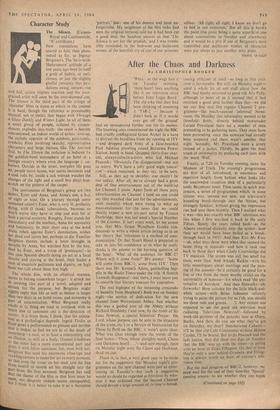Character Study
The Silence. (Cameo- Royal and Continentale; `X' certificate.)
Few reputations have soared as fast, then plum- meted as far, as Ingmar Bergman's. The 'he-is-with- Shakespeare' attitude of a few years ago bore in itself a grub of hubris, or anti- climax, or just the'slightly gleeful certainty that pe dulums swing, seesaws rise and fall, action implies reaction and the over- Praised artist will soon be the over-damned one. floe Silence is the third part of the trilogy of 'chamber' films (a name at which in the context it is hard, though the reference is presumably musical, not to smile), that began with Through a Glass Darkly'and Winter Light. In all of them a small group of people, isolated by circum- stances, explodes into truth: the result IN fiercely concentrated, an indoor world of airless :lose-up, the stylistic opposite of the outdoor, panoramic, symbolic films involving sketchy, representative characters and large themes, like The Seventh Seal, In The Silence the isolation is induced 1-y the goldfish-bowl atmosphere of an hotel in a foreign country where even the language is un- known. Outside in the street, everyday life goes on, people move house, war seems imminent and a tank rolls by; inside a sick wbman watches the changes of the light and a small boy plays hop- scotch on the pattern of the carpet.
The instruments of Bergman's group are two sisters, Ester and Anna, and Anna's son, a boy of eight or nine. On a journey through some unnamed country Ester, who is very ill, probably dying, with' (I think) tuberculosis, becomes so much worse they have to stop and wait for at least a partial recovery. Roughly, Ester stands for masculinity and the intellect, Anna for sensuality
and femininity. In their short stay at the hotel Anna rebels against Ester's domination, wishes her dead and leaves her, perhaps to die. Familiar Bergman themes include a lover brought in secretly by Anna, but watched first by the boy, then by Ester, and a troop of `grotesques'—in this case Spanish dwarfs doing an act at a local theatre and staying at the hotel, their leader a man of exquisite politeness and dignity, on high heels but-still about three feet high.
The whole film, with its elliptical manner, seems to belong somewhere larger: it struck me as seeming like part of a novel, adapted and shrunk for the purpose, but Bergman might rightly reply that life as well as fiction is larger than two days in an hotel room, and economy is Part of concentration. What Bergman really excels at (a thing we tend to overlook with so much else to comment on) is the direction of actors: it is from them, I think, that his reputa- tion as a pychologist depends. Ingrid Thulin as Ester gives a performance so piteous and terrible that it makes us feel we are in at the death of something—a soul, or at least a relationship and an illusion, as well as a body. Gunnel Lindblom as the sister has a more conventional part and ?,lays it with feline nastiness; but, even with her, Bergman has used his enormous close-ups and crawling camera to make her act in every moment, so that even the sweat on her neck and the line from nostril to mouth set her straight into the Part from the first moment. Bergman has said that the theme of the film is that love must be open, not despotic (which seems, unarguable); but I think it is better to take it as a themeless 'portrait,' just: one of his densest and most un- forgettable. My neighbour at the film (who had seen the original version) told me it had been cut a good deal, the handout assures us that The Silence is not for the prudish,' and I was irresis- tibly reminded, in the bedroom and bathroom scenes, of the heartfelt cry of one of our primmer critics: 'All right, all right, I know we don't go to bed in our overcoats.' But all this is hardly the point (the point being a quite superficial one about conventions in Sweden and elsewhere), and it would be a pity if one of Bergman's most controlled and deliberate studies of character were put about as just another sexy piece.
ISABEL QUIGLY






































 Previous page
Previous page